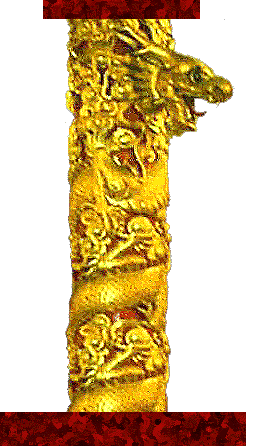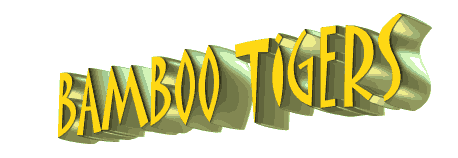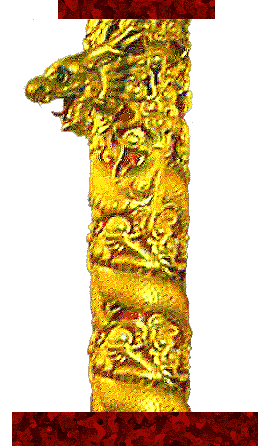| |
On March 13th, a call phoned into the Task Force reported shots fired on Amherst Street in the vicinity of Peter Cheung's home. Peter Cheung, who would turn 18 on March 30th, was an old friend of Gan Wah's. It occurred to the Force, which had learned to expect the worst, that the swimming dragon might have been hiding out at Peter's. Could those shots mean he'd opened his golden-toothed mouth once too often and suffered execution for treason?
Foley and Mollat staked out the house and waited for Peter Cheung's parents to come home.
Amherst Street is sandwiched between Princeton and Yale. Despite the Ivy League names of the streets, University Mound is a blue-collar district near the city's southern border, comprised of modest stucco houses. Those on Amherst stand stiffly in a row, and Peter's was remarkable only for its sandy color highlighted by raspberry garage doors and like-painted overhanging eaves.
His folks arrived by car around 9 that evening. The garage door swung upward, and there stood Peter Cheung, 5-foot-5 and 120 very mean pounds. His parents got out of the car and started to enter through the garage. Foley, thinking Gan Wah might be inside, dashed toward the house. When he reached a point about 25 feet away, Peter spotted him, yanked his mother into the garage, slammed shut the raspberry door, and left his father standing forlornly outside.
Foley, joined by Mollat, ignored Peter's poppa and marched stridently to the gateway grille barring entry to the few steps leading up to the house. The grille was decorated with several closed padlocks. In response to "Open up in the name of the law!", or words to that effect, Peter taunted them from the doorway a few feet away: "Fuck you! I don't have to open up."
His choice of words enraged both cops. Four arms stretched forth flailing, like a crazed giant squid, straining through the grating to grab arrogant Peter by the neck. But the long arms of the law were too short; they couldn't reach him.
The disgruntled officers returned the next morning at 10:15 to begin a quiet, dignified surveillance unobserved.
At 11, a tan Chevy station wagon pulled up across the street. The policemen recognized the driver as Dana, twin of Tom Yu. Dana honked the horn. Peter Cheung stuck his head out of an upstairs window, acknowledged the honk with a nod, and shortly thereafter opened the raspberry door of the garage.
Dressed in his pajamas, Peter huddled half an hour with Dana under the raised hood of a Roadrunner parked in the driveway. Dana, to whom, with brother Chester, Stuart Lin had entrusted his car, appeared to be working on the motor while they talked. Then Dana left in his station wagon. Peter pulled the Roadrunner into the garage. He closed the door.
For the next 20 minutes, at frequent intervals, he poked his head in and out of the upstairs window, looking up and down the street. He did not, however, notice Tim Simmons and Fred Lau, who joined the stake-out about that time.
Another vehicle drove up at 11:53. A second time, Peter opened the raspberry door. His friends went inside and, five minutes later, left. On the stroke of noon, when an air-raid siren blasts over the City of San Francisco to let everybody know it's time for lunch, the tan station wagon returned. Honk! Honk! Peter at the window. The raspberry door open and shut. But that time Peter came out and left in the car with Dana.
This dull routine would have put anybody to sleep, so Fred Mollat could hardly be blamed for closing his eyes. Ten minutes later, keeping himself awake with an occasional pinch, Foley glimpsed a hunched figure with a shopping bag, walking down the street. He grabbed his field glasses.
"Christ, I think it's Gan Wah Woo!" he cried, giving Mollat a punch. Mollat stirred, his half-open eyes looking in the direction Foley's trembling field glasses were trained. "Looks like an old lady to me," he muttered.
"Goddammit, it IS Gan Wah!" Foley insisted with vigor.
And, by God, it was.
Suddenly, the tan station wagon came from the same direction as the swimming dragon, stopped, and Peter Cheung jumped out. He trotted over to Gan Wah, escorted him to the raspberry door, opened it, let him in, then turned and left in the station wagon with Dana.
It could be that Dana had come by the first time to inform Peter, while appearing to fiddle around under the hood of the Roadrunner, that Gan Wah would soon be his house guest. That settled, he had gone off to get Gan Wah, who must have been waiting about 15 minutes' drive away.
In the interim, other members of the gang stopped off to see Peter for a few minutes in the privacy of the garage, perhaps to check on the current situation.
By then, Dana had retrieved Gan Wah from wherever he was and dropped him off to wait within walking distance of the house. The mechanic came back to get Peter, probably took him to Gan Wah, and the host may have read the safe-house rules to the guest: "Just walk like a regular person, but don't look around. When you get there, we'll be right behind you in the car. I'll jump out, open the garage door, and you hurry inside. Then I'll take off with Dana. Nobody will even notice. Sit tight till I come back later." Meanwhile, the stake-out units had radioed headquarters. Lt. Murphy and Deasy were responding quickly to the scene with Gan Wah's arrest warrant in hand. A black-and-white unit arrived and kept surveillance on the rear of the house.
Lau telephoned Peter Cheung's number. Gan Wah answered.
"We know you're in there, Gan Wah," stated Lau. "What are we supposed to do?" The Force ran no risks with Gan Wah's cover, even though the swimming dragon had stretched his territorial boundaries with the police somewhat beyond the limit.
"Well, I better not come out to you guys, or they'll hear about it from the neighbors and suspect something," said Gan Wah on the other end of the wire.
"We'll come in."
"O.K., but you better make it look good."
En masse, the six detectives broke down the gate with a crowbar and kicked out the front door, after getting no response to cries of "Police! Police! Come out with your hands up!", and that kind of stuff.
Murphy started up the stairs to the second floor, cooing softly, "Robert, Robert, it's me, Lieutenant Murphy." (Gan Wah's American name was Robert.) The other cops--knowing that for some reason Gan Wah disliked Murphy, but had always been nice to his face--cowered behind the cover of the lieutenant, and thought: Oh, Christ, we'll all get wasted when Gan Wah hears that voice; he HATES Murphy!
Footsteps were heard at the top of the stairs. Gan Wah's face peered over the bannister, his gold teeth flashing in a welcoming smile.
He was immediately placed under arrest.
Gan Wah told them there were guns behind the refrigerator. The cops all looked at each other. Were these the Golden Dragon guns? Had Gan Wah come through again?
That possibility changed the color of the situation from embarrassed pink to "condition red." Foley drove downtown and asked Levine to write out a search warrant for the house and an arrest warrant for Peter Cheung. It took three or four hours by the time Judge Albert C. Wollenberg signed them.
Somewhere in the interval, Peter Cheung had driven by, had seen the police cars, and kept on going, headed for parts then unknown.
When Foley returned with the warrants, Peter's mother and father were at home. Fred Lau explained everything to them in Cantonese. They were asked if they owned any guns. The answer was "No." The cops began a sham search of the house, knowing all the time where the weapons were.
When they found them, there was a great to-do. "Oh, my goodness, what have we here? Did you know there were guns behind the refrigerator, Mr. Cheung?" Honestly shocked, the poor gentleman cried: "Oh, no, no, what are they doing back there?" With genuine compassion: "They belong to your son, Mr. Cheung; he's mixed up with a gang."
They were not the Golden Dragon guns.
The Gang Task Force watched Gan Wah go undercover again, this time behind bars, where they could keep an eye on him. Their police reports reflected nothing of the swimming dragon's role as informant. That remained a carefully guarded and dangerous secret.
The forced entry and the search of the house were bogus but necessary operations designed to protect Gan Wah's cover. His apprehension and arrest on a felony warrant this time, however, were legitimate, as was the warrant of arrest for Peter Cheung on the charge of harboring a fugitive.
Among other questions the Task Force asked Gan Wah at the time of this arrest was the whereabouts of his much abused car. He told them it was out by the Cow Palace. A recovery crew found it, but they were too late. It was a shambles. The crew left the valiant little Chevy where it lay resting in pieces.
A few days after the conclusion of Gan Wah's first adventure in the Chinese calendar's Year of the Horse, the Gregorian calendar announced the equinoctial opening of the theater of spring, where winter's underground rehearsal comes to full flower on stage.
The Golden Dragon investigation was more than six months old. A survey of its repertory revealed four incomplete scenes: the contributions of Gan Wah Woo; the statement on tape by Stuart Lin; the peripheral dynamite case against Bert Rodriguez and Wayne Yee; the detention, on another charge, of Peter Ng. Not much, but the play had to go on.
The directors of the Gang Task Force went into a huddle. At least, they concluded, there were actors. With them, they could improvise. Gan Wah, having rendered himself useless as an agent, would have to be indicted, but he remained important as a potential witness against Stuart Lin, who was aching to confess. The testimony of Cornell "Sam" Lee would probably convict Bert and Wayne, and those two had consorted, presumably in ignorance, with the Golden Dragon slayers. Peter "the-Hundred-Year-Egg" Ng still glared defiantly from atop the wall of silence, but, as every pre-schooler knows, eggs who sit on walls eventually have big falls.
The Dragon Force could not afford to be reluctant anymore. The time had come for the City of San Francisco and the waiting world to view the continuing drama of the Golden Dragon. The public had already bought its tickets by scanning the newspapers every day, discounting each month of growing anticipation. The victims, both dead and wounded, had paid full price.
On March 24, 1978, the curtain rose.
| |
|









